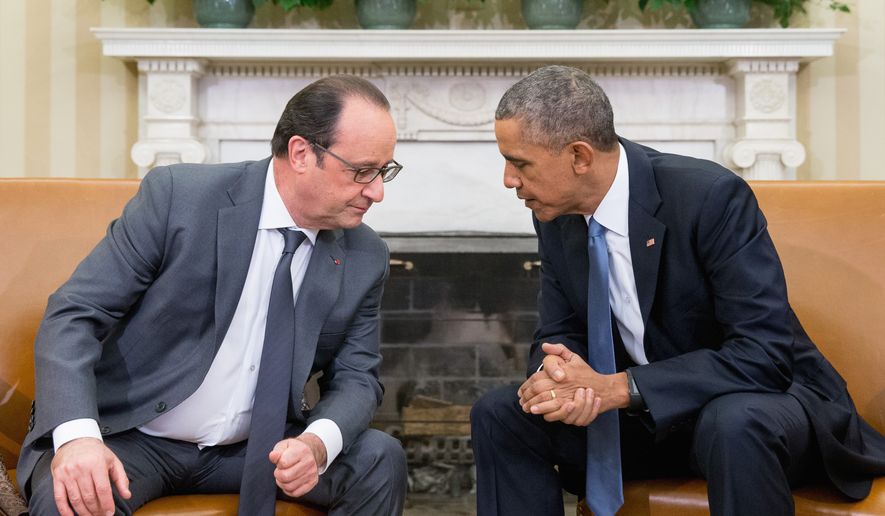President Obama pledged with France Tuesday to step up airstrikes against Islamic State militants in the wake of the deadly terrorist attacks in Paris, but stopped short of accepting a proposal pushed by visiting French President Francois Hollande for a new international military coalition that would include troublesome Russia.
Emerging from an Oval Office meeting with Mr. Hollande, Mr. Obama said he agreed with the French leader’s request for stronger military action against the extremist group’s base in Syria and Iraq. They said the U.S.-led coalition will conduct more strikes on terrorist command centers, and on oil truck convoys that provide the group with cash.
“We are here today to declare that the United States and France stand united in total solidarity to deliver justice to these terrorists and those who sent them and to defend our nations,” Mr. Obama said. “This barbaric terrorist group … and its murderous ideology poses a serious threat to all of us. It cannot be tolerated. It must be destroyed. And we must do it together.”
Mr. Hollande, who this week is holding one-on-one meetings with the leaders of Britain, the U.S., Germany and Russia after the attacks that left 130 people dead in the French capital, said the coalition must fight with “relentless determination” to destroy the extremists “no matter where they are.”
But the French president’s plan to compel Mr. Obama to join forces with Russia in the fight was complicated Tuesday by the downing of a Russian military plane by Turkey, a U.S. ally in the coalition. Russia’s military is fighting in support of Syrian President Bashar Assad, while the U.S. is seeking Mr. Assad’s ouster as the first step toward stabilizing the war-torn nation and enabling the coalition to fight the Islamic State more effectively.
Both leaders urged Turkey and Russia not to escalate the confrontation. But Mr. Obama said the shoot-down “points to an ongoing problem with the Russian operations,” because Moscow’s forces are fighting near the Turkish border and are attacking moderate Syrian opposition forces supported by Turkey and the U.S. — with minimal coordination with the U.S. and its allies.
SEE ALSO: Iraq’s Sunni sheikhs decry lack of U.S. help in ISIS fight, say Russia eager to fill void
“If Russia is directing its energies towards Daesh and ISIL, some of those conflicts or potentials for mistakes or escalation are less likely to occur,” Mr. Obama said, using alternate names for the Islamic State.
Mr. Obama responded testily to a question about whether he and Mr. Hollande had made any progress toward the French leader’s suggestion for the U.S. and Moscow to join forces.
“We’ve got a coalition — of 65 countries, who’ve been active in pushing back against ISIL for quite some time,” Mr. Obama said. “Russia right now is a coalition of two — Iran and Russia supporting Assad. Russia’s the outlier. We hope that they refocus their attention on what is the most substantial threat. If and when they do, it will make it easier for us to go after ISIL and Daesh.”
Without any new strategy to announce, Mr. Obama highlighted an intelligence-sharing agreement struck last week that has helped France to attack Islamic State sites in Raqqa, Syria. The president also urged European leaders to do more to stop the flow of foreign fighters, share airline passenger lists and exchange information.
Mr. Hollande meets Wednesday with German Chancellor Angela Merkel and then travels Thursday to Moscow, where he said he will encourage Russian President Vladimir Putin to concentrate his military action on the Islamic State and to “fully commit” to a political solution in Syria that includes Mr. Assad stepping down.
“We want to gather all countries, all those who are willing to find and implement a political solution in Syria,” Mr. Hollande said. “We do not want to exclude anyone, but we want to make sure that this political solution can eradicate terrorism.”
SEE ALSO: Pentagon backs Turkey’s version of events, blames ‘incursion’ of Russian jet
After the press conference in the East Room, Vice President Joseph R. Biden told reporters that Mr. Putin “is coming to the realization that Assad should transition out.”
The military steps that Mr. Obama and Mr. Hollande outlined were essentially a ramping-up of the current strategy in Syria and Iraq, rather than a new course. Some critics said the administration’s current plan to defeat the Islamic State isn’t working.
“Instead of doubling down on the same failed policies that allowed for ISIS’s rise, the Obama administration ought to be laying out the broad, overarching strategy needed to win,” said House Foreign Affairs Committee Chairman Ed Royce, California Republican. “This should include establishing safe zones in Syria, arming fighting forces — including the Kurds — already on the ground, and giving our pilots the authority and flexibility they need to carry out their missions.”
Mr. Royce added, “Two weeks ago it was France. Next week, it could be us. The White House needs to get serious about eliminating this terrorist threat.”
• Dave Boyer can be reached at dboyer@washingtontimes.com.




Please read our comment policy before commenting.